Sustainable and Responsible Tourism Management Report - Module ABC
VerifiedAdded on 2022/12/29
|20
|5888
|38
Report
AI Summary
This report delves into the realm of sustainable and responsible tourism management, examining its evolution, principles, and the roles of key global organizations like UNWTO and WTTC. It explores the concept's development, particularly in the context of Iceland, and analyzes the functions and missions of leading organizations. The report investigates the purpose and principles of tourism development and planning to minimize adverse effects, evaluating different approaches and challenges. It further examines the socio-cultural, economic, and environmental impacts of the tourism industry, emphasizing stakeholder engagement and partnerships for sustainable practices. The analysis extends to the development and management of sustainability in tourist destinations, offering justified recommendations for improvement. The report underscores the importance of balancing tourism growth with environmental and social responsibility, providing a comprehensive overview of sustainable tourism management strategies and their practical applications.
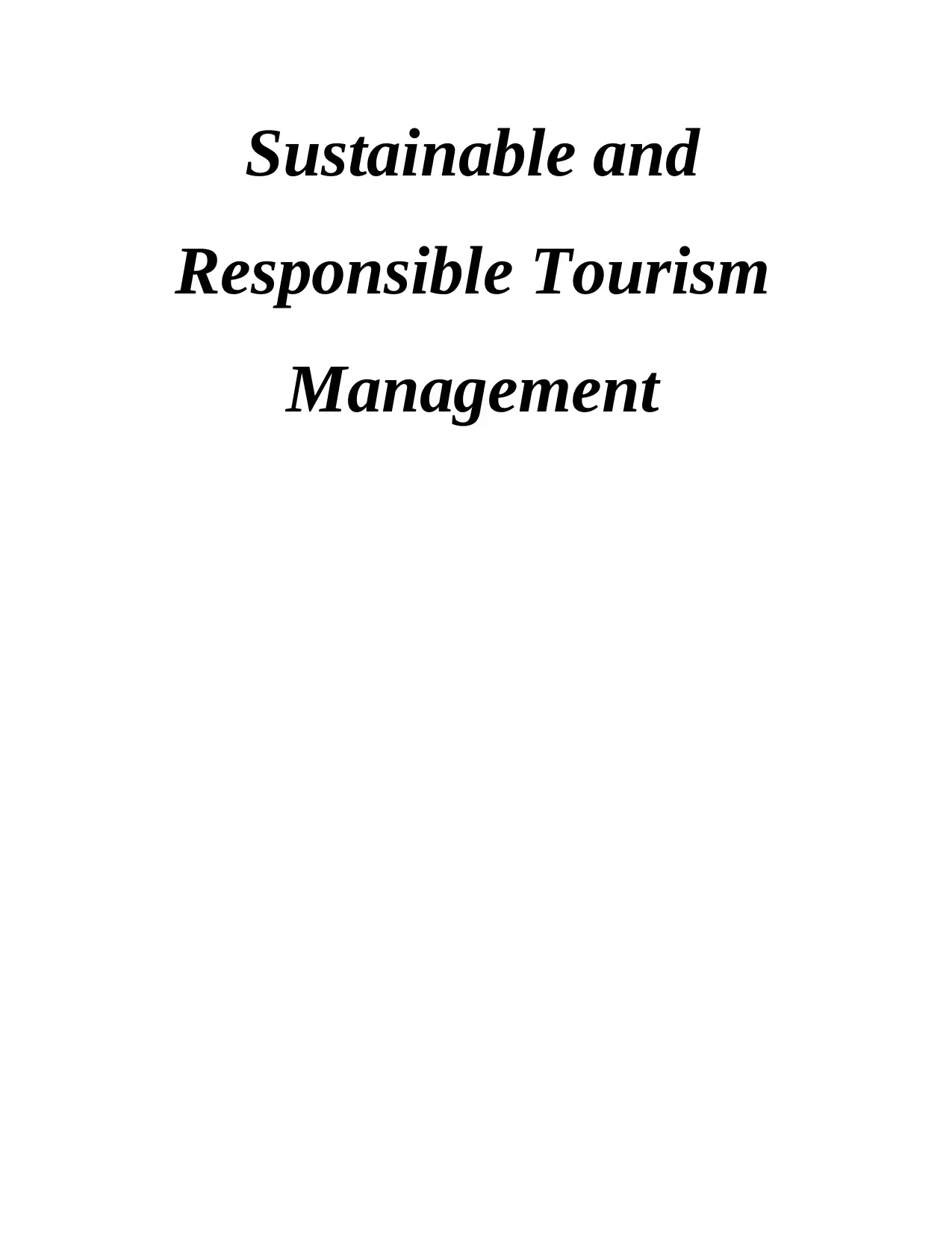
Sustainable and
Responsible Tourism
Management
Responsible Tourism
Management
Paraphrase This Document
Need a fresh take? Get an instant paraphrase of this document with our AI Paraphraser
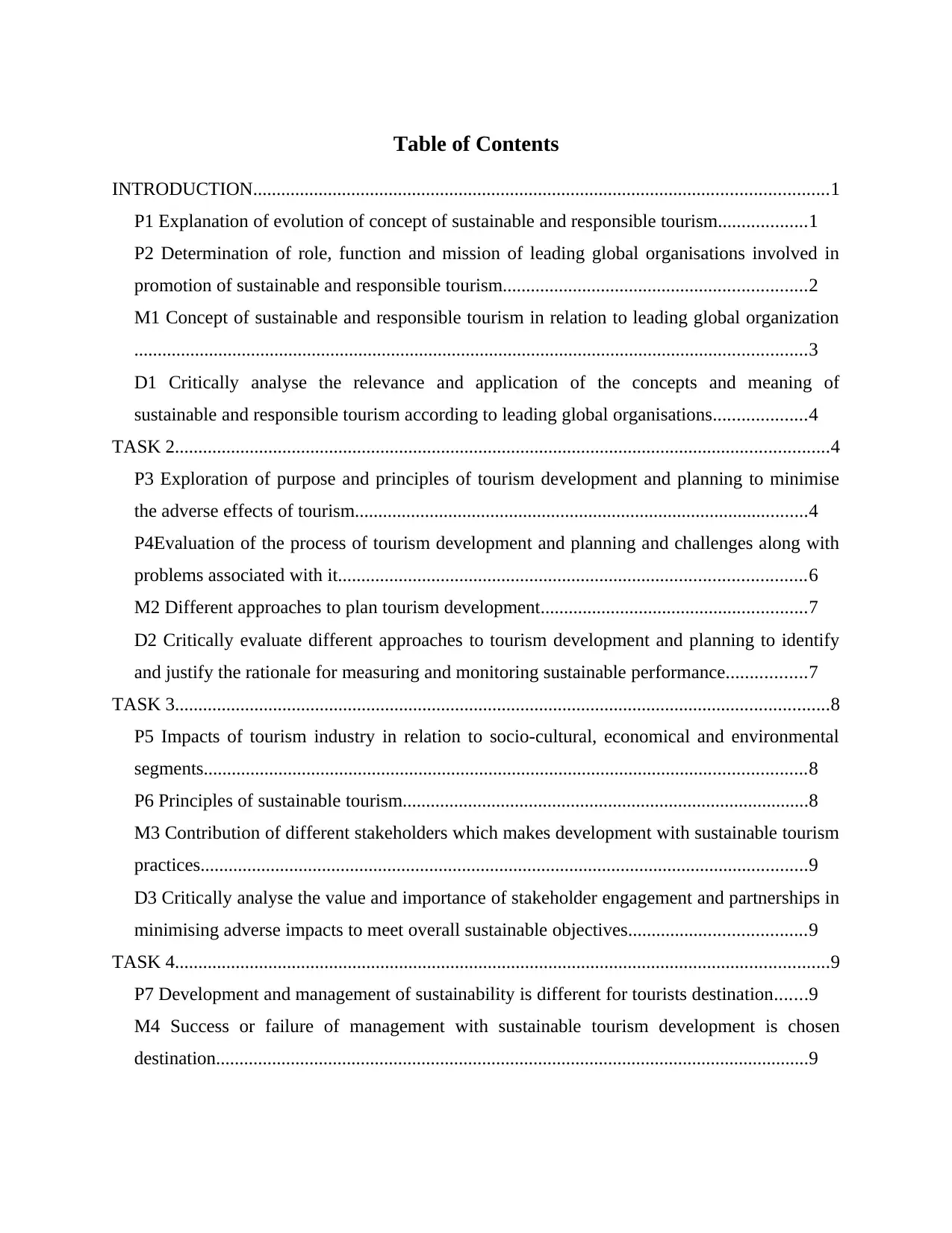
Table of Contents
INTRODUCTION...........................................................................................................................1
P1 Explanation of evolution of concept of sustainable and responsible tourism...................1
P2 Determination of role, function and mission of leading global organisations involved in
promotion of sustainable and responsible tourism.................................................................2
M1 Concept of sustainable and responsible tourism in relation to leading global organization
................................................................................................................................................3
D1 Critically analyse the relevance and application of the concepts and meaning of
sustainable and responsible tourism according to leading global organisations....................4
TASK 2............................................................................................................................................4
P3 Exploration of purpose and principles of tourism development and planning to minimise
the adverse effects of tourism.................................................................................................4
P4Evaluation of the process of tourism development and planning and challenges along with
problems associated with it....................................................................................................6
M2 Different approaches to plan tourism development.........................................................7
D2 Critically evaluate different approaches to tourism development and planning to identify
and justify the rationale for measuring and monitoring sustainable performance.................7
TASK 3............................................................................................................................................8
P5 Impacts of tourism industry in relation to socio-cultural, economical and environmental
segments.................................................................................................................................8
P6 Principles of sustainable tourism.......................................................................................8
M3 Contribution of different stakeholders which makes development with sustainable tourism
practices..................................................................................................................................9
D3 Critically analyse the value and importance of stakeholder engagement and partnerships in
minimising adverse impacts to meet overall sustainable objectives......................................9
TASK 4............................................................................................................................................9
P7 Development and management of sustainability is different for tourists destination.......9
M4 Success or failure of management with sustainable tourism development is chosen
destination...............................................................................................................................9
INTRODUCTION...........................................................................................................................1
P1 Explanation of evolution of concept of sustainable and responsible tourism...................1
P2 Determination of role, function and mission of leading global organisations involved in
promotion of sustainable and responsible tourism.................................................................2
M1 Concept of sustainable and responsible tourism in relation to leading global organization
................................................................................................................................................3
D1 Critically analyse the relevance and application of the concepts and meaning of
sustainable and responsible tourism according to leading global organisations....................4
TASK 2............................................................................................................................................4
P3 Exploration of purpose and principles of tourism development and planning to minimise
the adverse effects of tourism.................................................................................................4
P4Evaluation of the process of tourism development and planning and challenges along with
problems associated with it....................................................................................................6
M2 Different approaches to plan tourism development.........................................................7
D2 Critically evaluate different approaches to tourism development and planning to identify
and justify the rationale for measuring and monitoring sustainable performance.................7
TASK 3............................................................................................................................................8
P5 Impacts of tourism industry in relation to socio-cultural, economical and environmental
segments.................................................................................................................................8
P6 Principles of sustainable tourism.......................................................................................8
M3 Contribution of different stakeholders which makes development with sustainable tourism
practices..................................................................................................................................9
D3 Critically analyse the value and importance of stakeholder engagement and partnerships in
minimising adverse impacts to meet overall sustainable objectives......................................9
TASK 4............................................................................................................................................9
P7 Development and management of sustainability is different for tourists destination.......9
M4 Success or failure of management with sustainable tourism development is chosen
destination...............................................................................................................................9
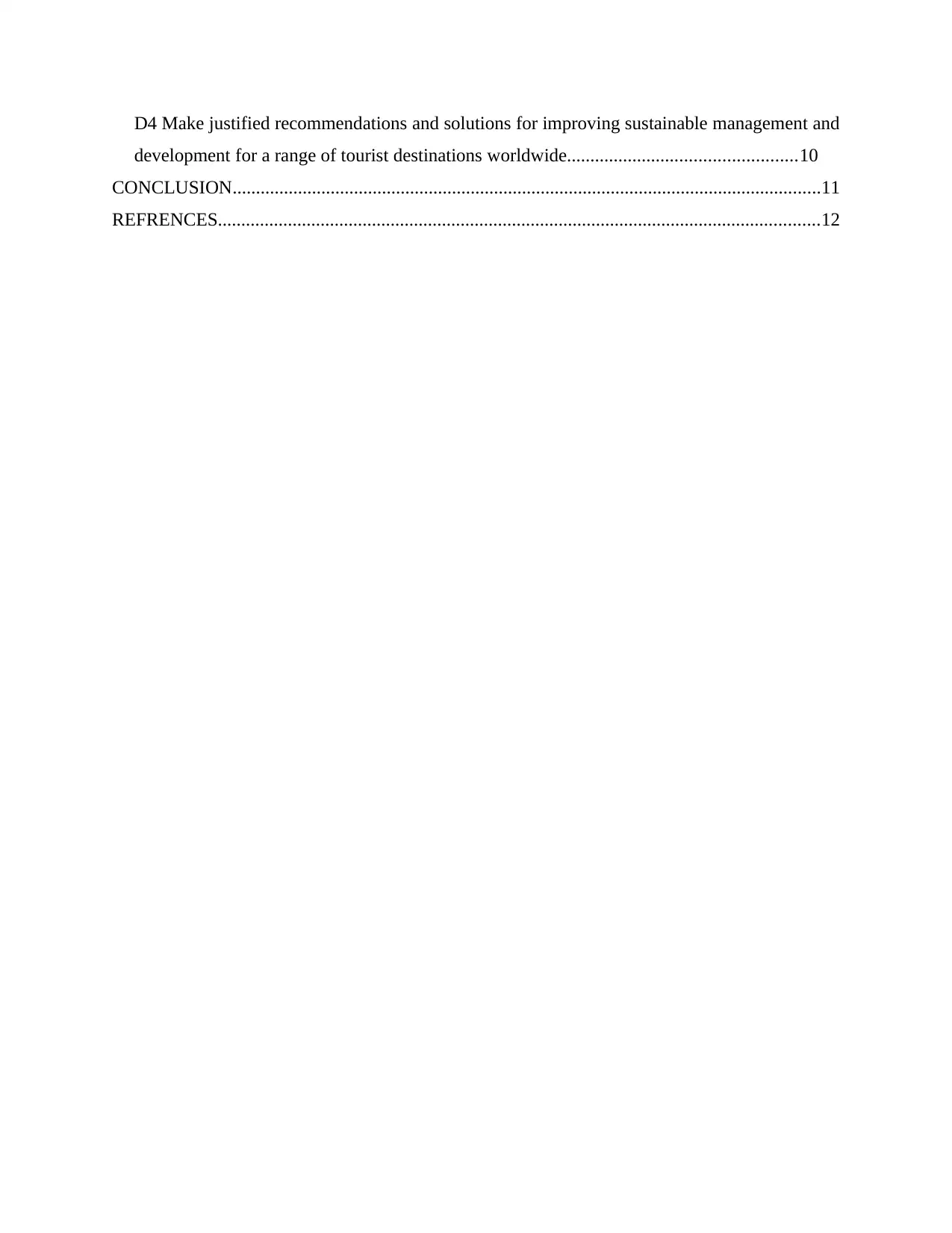
D4 Make justified recommendations and solutions for improving sustainable management and
development for a range of tourist destinations worldwide.................................................10
CONCLUSION..............................................................................................................................11
REFRENCES.................................................................................................................................12
development for a range of tourist destinations worldwide.................................................10
CONCLUSION..............................................................................................................................11
REFRENCES.................................................................................................................................12
⊘ This is a preview!⊘
Do you want full access?
Subscribe today to unlock all pages.

Trusted by 1+ million students worldwide
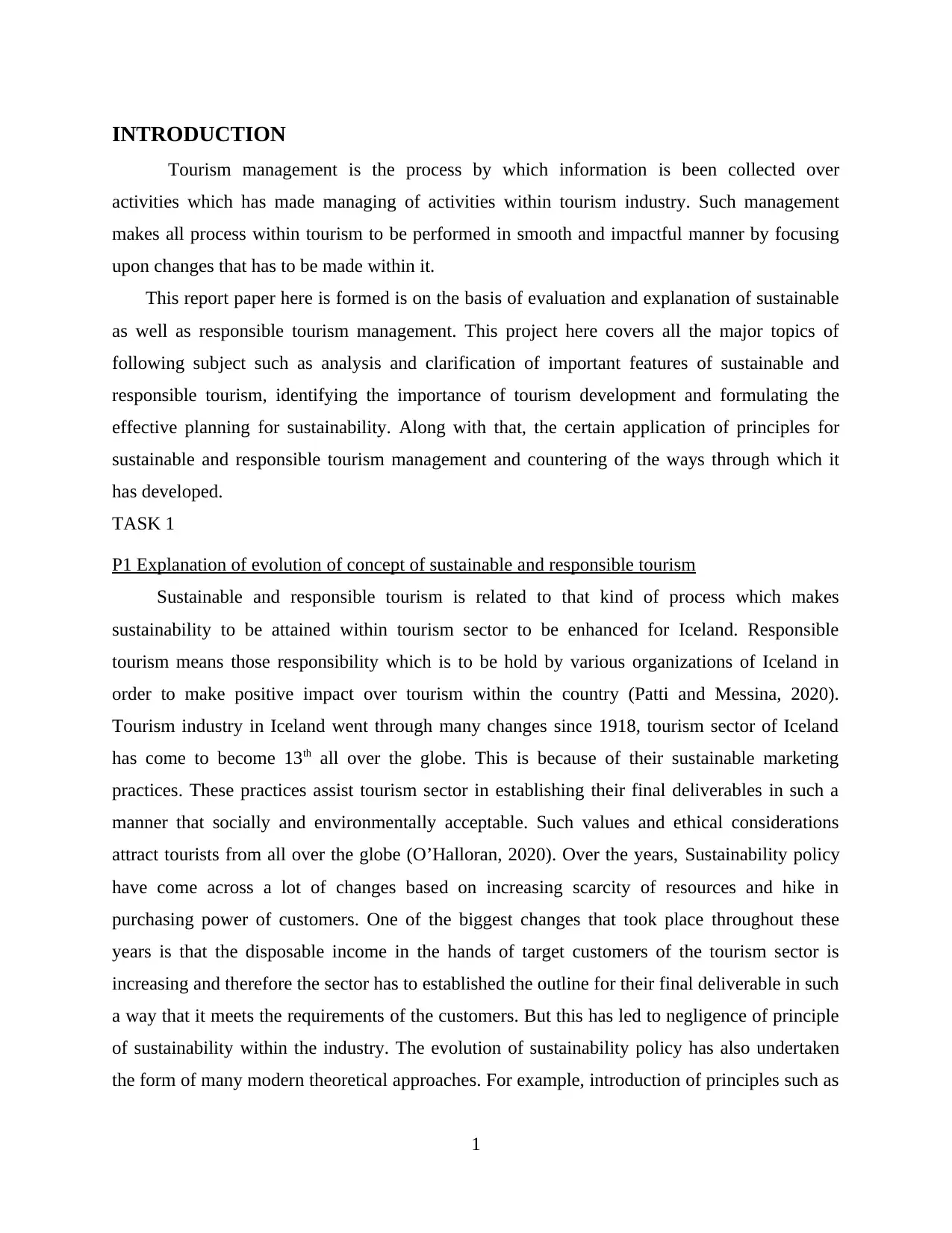
INTRODUCTION
Tourism management is the process by which information is been collected over
activities which has made managing of activities within tourism industry. Such management
makes all process within tourism to be performed in smooth and impactful manner by focusing
upon changes that has to be made within it.
This report paper here is formed is on the basis of evaluation and explanation of sustainable
as well as responsible tourism management. This project here covers all the major topics of
following subject such as analysis and clarification of important features of sustainable and
responsible tourism, identifying the importance of tourism development and formulating the
effective planning for sustainability. Along with that, the certain application of principles for
sustainable and responsible tourism management and countering of the ways through which it
has developed.
TASK 1
P1 Explanation of evolution of concept of sustainable and responsible tourism
Sustainable and responsible tourism is related to that kind of process which makes
sustainability to be attained within tourism sector to be enhanced for Iceland. Responsible
tourism means those responsibility which is to be hold by various organizations of Iceland in
order to make positive impact over tourism within the country (Patti and Messina, 2020).
Tourism industry in Iceland went through many changes since 1918, tourism sector of Iceland
has come to become 13th all over the globe. This is because of their sustainable marketing
practices. These practices assist tourism sector in establishing their final deliverables in such a
manner that socially and environmentally acceptable. Such values and ethical considerations
attract tourists from all over the globe (O’Halloran, 2020). Over the years, Sustainability policy
have come across a lot of changes based on increasing scarcity of resources and hike in
purchasing power of customers. One of the biggest changes that took place throughout these
years is that the disposable income in the hands of target customers of the tourism sector is
increasing and therefore the sector has to established the outline for their final deliverable in such
a way that it meets the requirements of the customers. But this has led to negligence of principle
of sustainability within the industry. The evolution of sustainability policy has also undertaken
the form of many modern theoretical approaches. For example, introduction of principles such as
1
Tourism management is the process by which information is been collected over
activities which has made managing of activities within tourism industry. Such management
makes all process within tourism to be performed in smooth and impactful manner by focusing
upon changes that has to be made within it.
This report paper here is formed is on the basis of evaluation and explanation of sustainable
as well as responsible tourism management. This project here covers all the major topics of
following subject such as analysis and clarification of important features of sustainable and
responsible tourism, identifying the importance of tourism development and formulating the
effective planning for sustainability. Along with that, the certain application of principles for
sustainable and responsible tourism management and countering of the ways through which it
has developed.
TASK 1
P1 Explanation of evolution of concept of sustainable and responsible tourism
Sustainable and responsible tourism is related to that kind of process which makes
sustainability to be attained within tourism sector to be enhanced for Iceland. Responsible
tourism means those responsibility which is to be hold by various organizations of Iceland in
order to make positive impact over tourism within the country (Patti and Messina, 2020).
Tourism industry in Iceland went through many changes since 1918, tourism sector of Iceland
has come to become 13th all over the globe. This is because of their sustainable marketing
practices. These practices assist tourism sector in establishing their final deliverables in such a
manner that socially and environmentally acceptable. Such values and ethical considerations
attract tourists from all over the globe (O’Halloran, 2020). Over the years, Sustainability policy
have come across a lot of changes based on increasing scarcity of resources and hike in
purchasing power of customers. One of the biggest changes that took place throughout these
years is that the disposable income in the hands of target customers of the tourism sector is
increasing and therefore the sector has to established the outline for their final deliverable in such
a way that it meets the requirements of the customers. But this has led to negligence of principle
of sustainability within the industry. The evolution of sustainability policy has also undertaken
the form of many modern theoretical approaches. For example, introduction of principles such as
1
Paraphrase This Document
Need a fresh take? Get an instant paraphrase of this document with our AI Paraphraser
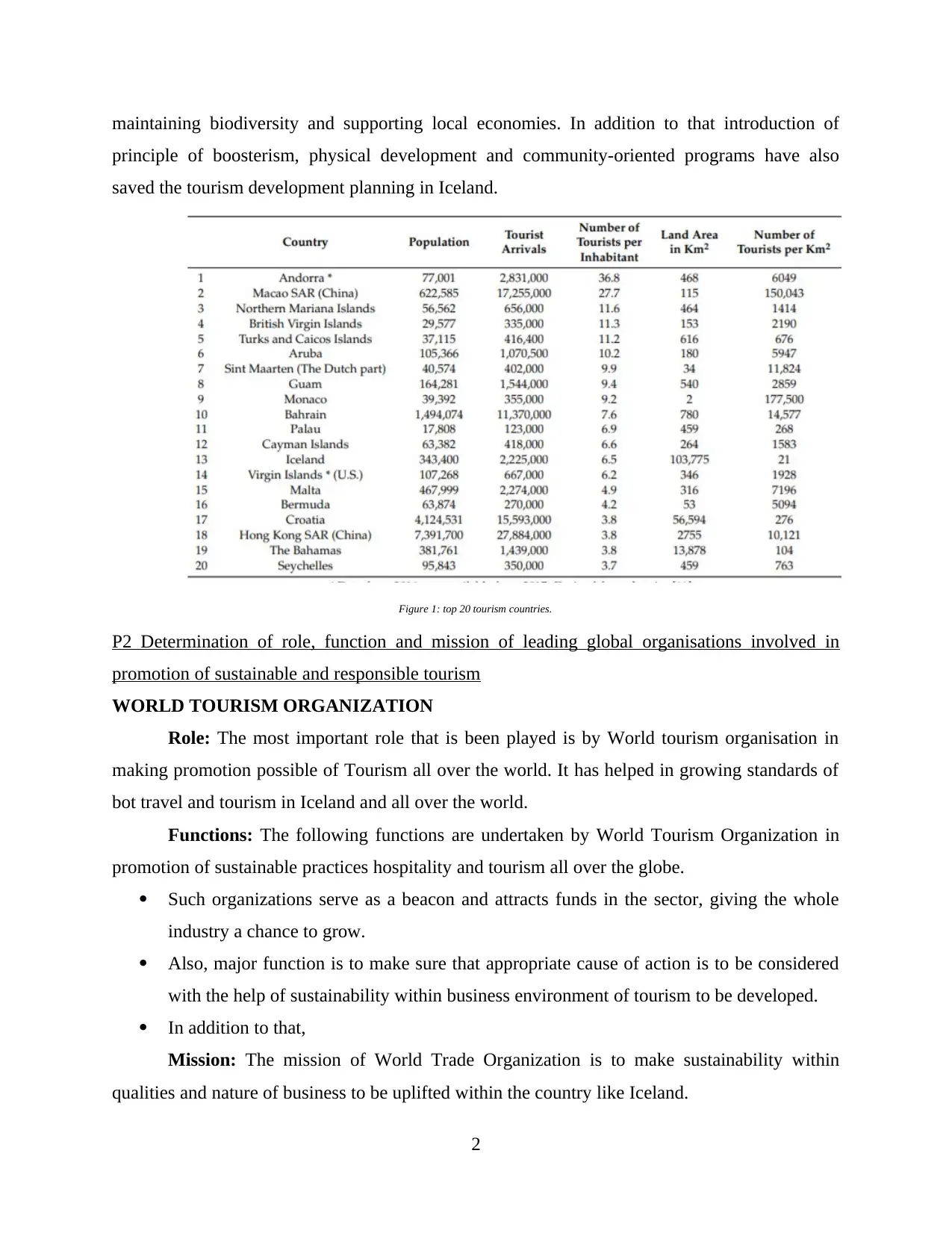
maintaining biodiversity and supporting local economies. In addition to that introduction of
principle of boosterism, physical development and community-oriented programs have also
saved the tourism development planning in Iceland.
Figure 1: top 20 tourism countries.
P2 Determination of role, function and mission of leading global organisations involved in
promotion of sustainable and responsible tourism
WORLD TOURISM ORGANIZATION
Role: The most important role that is been played is by World tourism organisation in
making promotion possible of Tourism all over the world. It has helped in growing standards of
bot travel and tourism in Iceland and all over the world.
Functions: The following functions are undertaken by World Tourism Organization in
promotion of sustainable practices hospitality and tourism all over the globe.
Such organizations serve as a beacon and attracts funds in the sector, giving the whole
industry a chance to grow.
Also, major function is to make sure that appropriate cause of action is to be considered
with the help of sustainability within business environment of tourism to be developed.
In addition to that,
Mission: The mission of World Trade Organization is to make sustainability within
qualities and nature of business to be uplifted within the country like Iceland.
2
principle of boosterism, physical development and community-oriented programs have also
saved the tourism development planning in Iceland.
Figure 1: top 20 tourism countries.
P2 Determination of role, function and mission of leading global organisations involved in
promotion of sustainable and responsible tourism
WORLD TOURISM ORGANIZATION
Role: The most important role that is been played is by World tourism organisation in
making promotion possible of Tourism all over the world. It has helped in growing standards of
bot travel and tourism in Iceland and all over the world.
Functions: The following functions are undertaken by World Tourism Organization in
promotion of sustainable practices hospitality and tourism all over the globe.
Such organizations serve as a beacon and attracts funds in the sector, giving the whole
industry a chance to grow.
Also, major function is to make sure that appropriate cause of action is to be considered
with the help of sustainability within business environment of tourism to be developed.
In addition to that,
Mission: The mission of World Trade Organization is to make sustainability within
qualities and nature of business to be uplifted within the country like Iceland.
2
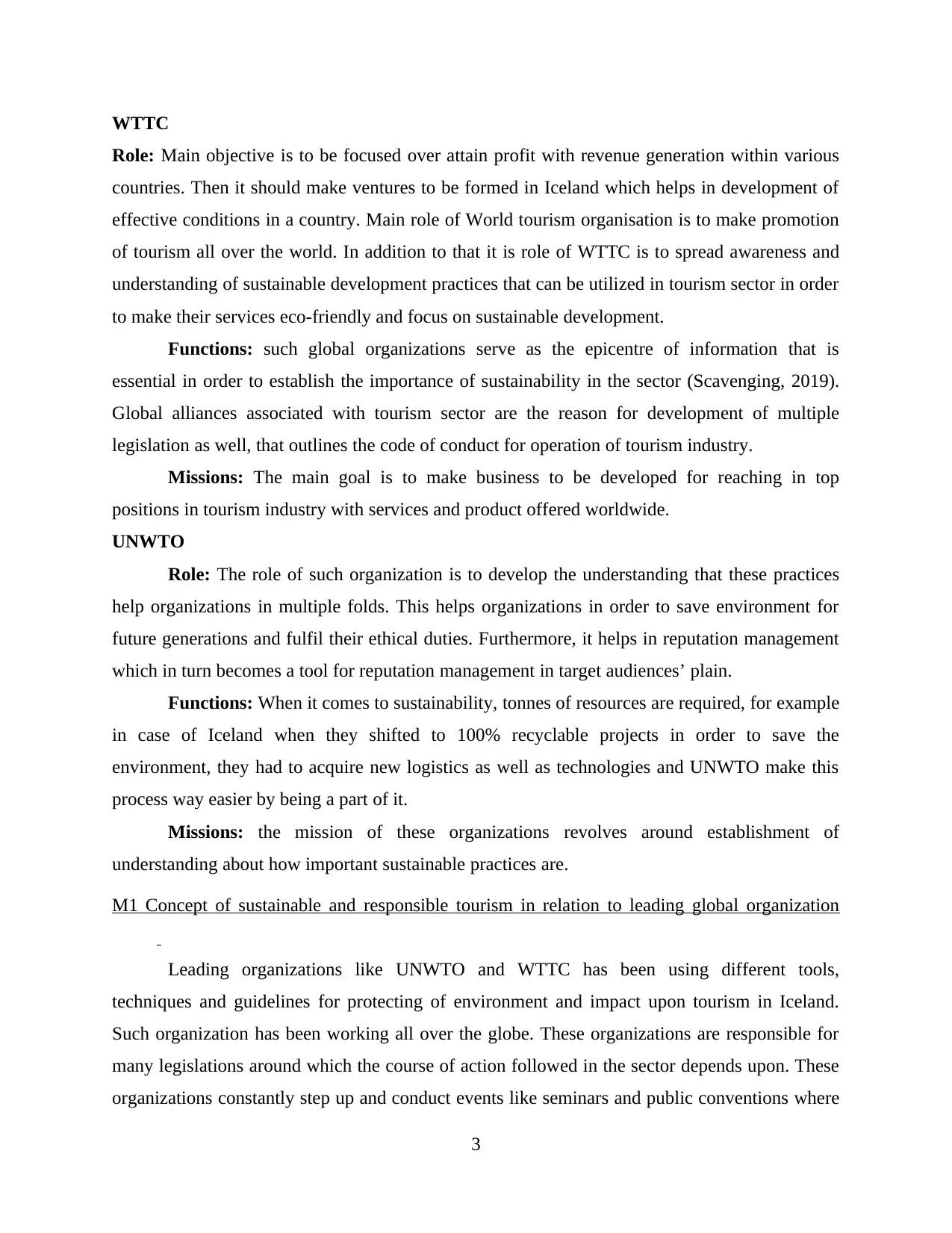
WTTC
Role: Main objective is to be focused over attain profit with revenue generation within various
countries. Then it should make ventures to be formed in Iceland which helps in development of
effective conditions in a country. Main role of World tourism organisation is to make promotion
of tourism all over the world. In addition to that it is role of WTTC is to spread awareness and
understanding of sustainable development practices that can be utilized in tourism sector in order
to make their services eco-friendly and focus on sustainable development.
Functions: such global organizations serve as the epicentre of information that is
essential in order to establish the importance of sustainability in the sector (Scavenging, 2019).
Global alliances associated with tourism sector are the reason for development of multiple
legislation as well, that outlines the code of conduct for operation of tourism industry.
Missions: The main goal is to make business to be developed for reaching in top
positions in tourism industry with services and product offered worldwide.
UNWTO
Role: The role of such organization is to develop the understanding that these practices
help organizations in multiple folds. This helps organizations in order to save environment for
future generations and fulfil their ethical duties. Furthermore, it helps in reputation management
which in turn becomes a tool for reputation management in target audiences’ plain.
Functions: When it comes to sustainability, tonnes of resources are required, for example
in case of Iceland when they shifted to 100% recyclable projects in order to save the
environment, they had to acquire new logistics as well as technologies and UNWTO make this
process way easier by being a part of it.
Missions: the mission of these organizations revolves around establishment of
understanding about how important sustainable practices are.
M1 Concept of sustainable and responsible tourism in relation to leading global organization
Leading organizations like UNWTO and WTTC has been using different tools,
techniques and guidelines for protecting of environment and impact upon tourism in Iceland.
Such organization has been working all over the globe. These organizations are responsible for
many legislations around which the course of action followed in the sector depends upon. These
organizations constantly step up and conduct events like seminars and public conventions where
3
Role: Main objective is to be focused over attain profit with revenue generation within various
countries. Then it should make ventures to be formed in Iceland which helps in development of
effective conditions in a country. Main role of World tourism organisation is to make promotion
of tourism all over the world. In addition to that it is role of WTTC is to spread awareness and
understanding of sustainable development practices that can be utilized in tourism sector in order
to make their services eco-friendly and focus on sustainable development.
Functions: such global organizations serve as the epicentre of information that is
essential in order to establish the importance of sustainability in the sector (Scavenging, 2019).
Global alliances associated with tourism sector are the reason for development of multiple
legislation as well, that outlines the code of conduct for operation of tourism industry.
Missions: The main goal is to make business to be developed for reaching in top
positions in tourism industry with services and product offered worldwide.
UNWTO
Role: The role of such organization is to develop the understanding that these practices
help organizations in multiple folds. This helps organizations in order to save environment for
future generations and fulfil their ethical duties. Furthermore, it helps in reputation management
which in turn becomes a tool for reputation management in target audiences’ plain.
Functions: When it comes to sustainability, tonnes of resources are required, for example
in case of Iceland when they shifted to 100% recyclable projects in order to save the
environment, they had to acquire new logistics as well as technologies and UNWTO make this
process way easier by being a part of it.
Missions: the mission of these organizations revolves around establishment of
understanding about how important sustainable practices are.
M1 Concept of sustainable and responsible tourism in relation to leading global organization
Leading organizations like UNWTO and WTTC has been using different tools,
techniques and guidelines for protecting of environment and impact upon tourism in Iceland.
Such organization has been working all over the globe. These organizations are responsible for
many legislations around which the course of action followed in the sector depends upon. These
organizations constantly step up and conduct events like seminars and public conventions where
3
⊘ This is a preview!⊘
Do you want full access?
Subscribe today to unlock all pages.

Trusted by 1+ million students worldwide
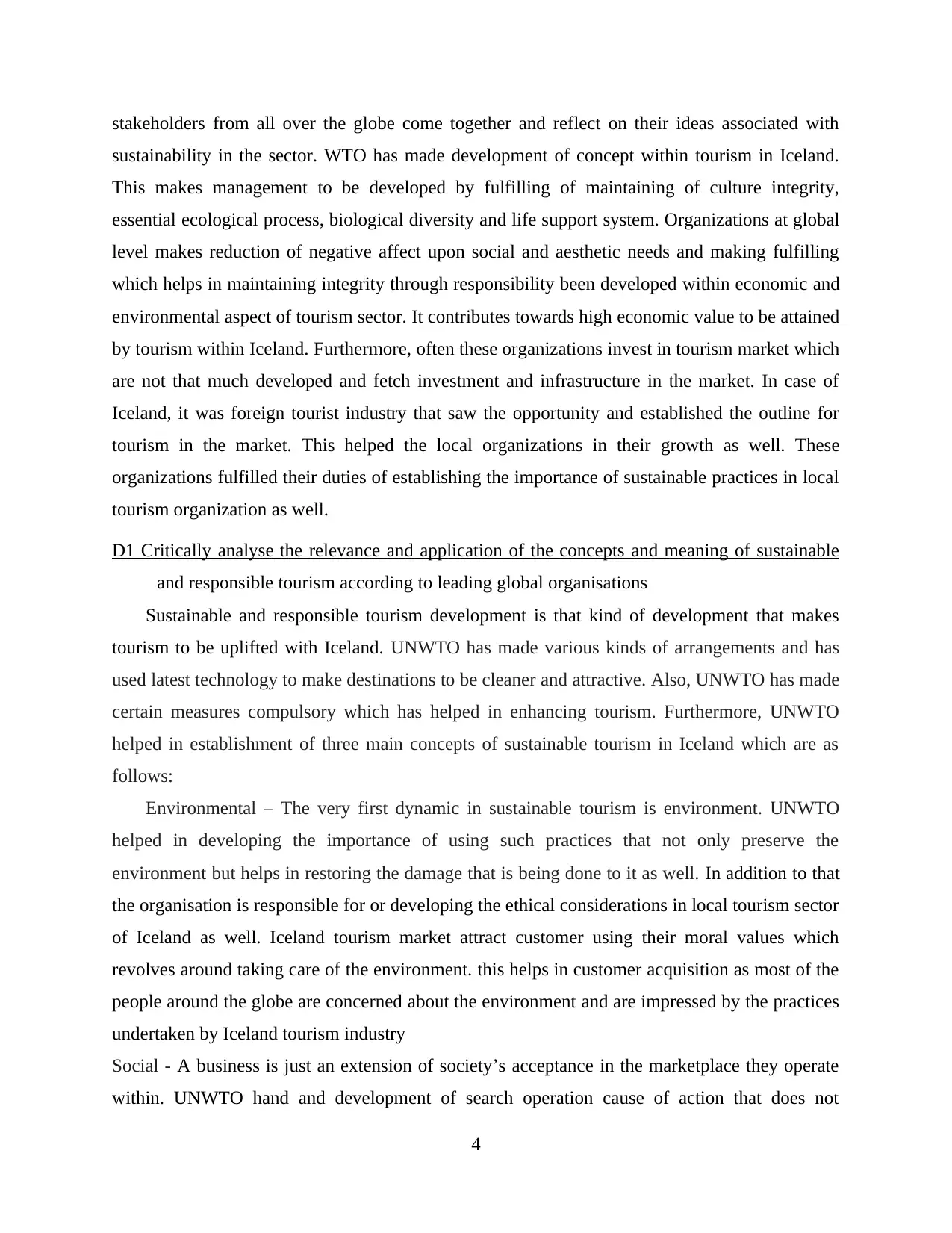
stakeholders from all over the globe come together and reflect on their ideas associated with
sustainability in the sector. WTO has made development of concept within tourism in Iceland.
This makes management to be developed by fulfilling of maintaining of culture integrity,
essential ecological process, biological diversity and life support system. Organizations at global
level makes reduction of negative affect upon social and aesthetic needs and making fulfilling
which helps in maintaining integrity through responsibility been developed within economic and
environmental aspect of tourism sector. It contributes towards high economic value to be attained
by tourism within Iceland. Furthermore, often these organizations invest in tourism market which
are not that much developed and fetch investment and infrastructure in the market. In case of
Iceland, it was foreign tourist industry that saw the opportunity and established the outline for
tourism in the market. This helped the local organizations in their growth as well. These
organizations fulfilled their duties of establishing the importance of sustainable practices in local
tourism organization as well.
D1 Critically analyse the relevance and application of the concepts and meaning of sustainable
and responsible tourism according to leading global organisations
Sustainable and responsible tourism development is that kind of development that makes
tourism to be uplifted with Iceland. UNWTO has made various kinds of arrangements and has
used latest technology to make destinations to be cleaner and attractive. Also, UNWTO has made
certain measures compulsory which has helped in enhancing tourism. Furthermore, UNWTO
helped in establishment of three main concepts of sustainable tourism in Iceland which are as
follows:
Environmental – The very first dynamic in sustainable tourism is environment. UNWTO
helped in developing the importance of using such practices that not only preserve the
environment but helps in restoring the damage that is being done to it as well. In addition to that
the organisation is responsible for or developing the ethical considerations in local tourism sector
of Iceland as well. Iceland tourism market attract customer using their moral values which
revolves around taking care of the environment. this helps in customer acquisition as most of the
people around the globe are concerned about the environment and are impressed by the practices
undertaken by Iceland tourism industry
Social - A business is just an extension of society’s acceptance in the marketplace they operate
within. UNWTO hand and development of search operation cause of action that does not
4
sustainability in the sector. WTO has made development of concept within tourism in Iceland.
This makes management to be developed by fulfilling of maintaining of culture integrity,
essential ecological process, biological diversity and life support system. Organizations at global
level makes reduction of negative affect upon social and aesthetic needs and making fulfilling
which helps in maintaining integrity through responsibility been developed within economic and
environmental aspect of tourism sector. It contributes towards high economic value to be attained
by tourism within Iceland. Furthermore, often these organizations invest in tourism market which
are not that much developed and fetch investment and infrastructure in the market. In case of
Iceland, it was foreign tourist industry that saw the opportunity and established the outline for
tourism in the market. This helped the local organizations in their growth as well. These
organizations fulfilled their duties of establishing the importance of sustainable practices in local
tourism organization as well.
D1 Critically analyse the relevance and application of the concepts and meaning of sustainable
and responsible tourism according to leading global organisations
Sustainable and responsible tourism development is that kind of development that makes
tourism to be uplifted with Iceland. UNWTO has made various kinds of arrangements and has
used latest technology to make destinations to be cleaner and attractive. Also, UNWTO has made
certain measures compulsory which has helped in enhancing tourism. Furthermore, UNWTO
helped in establishment of three main concepts of sustainable tourism in Iceland which are as
follows:
Environmental – The very first dynamic in sustainable tourism is environment. UNWTO
helped in developing the importance of using such practices that not only preserve the
environment but helps in restoring the damage that is being done to it as well. In addition to that
the organisation is responsible for or developing the ethical considerations in local tourism sector
of Iceland as well. Iceland tourism market attract customer using their moral values which
revolves around taking care of the environment. this helps in customer acquisition as most of the
people around the globe are concerned about the environment and are impressed by the practices
undertaken by Iceland tourism industry
Social - A business is just an extension of society’s acceptance in the marketplace they operate
within. UNWTO hand and development of search operation cause of action that does not
4
Paraphrase This Document
Need a fresh take? Get an instant paraphrase of this document with our AI Paraphraser
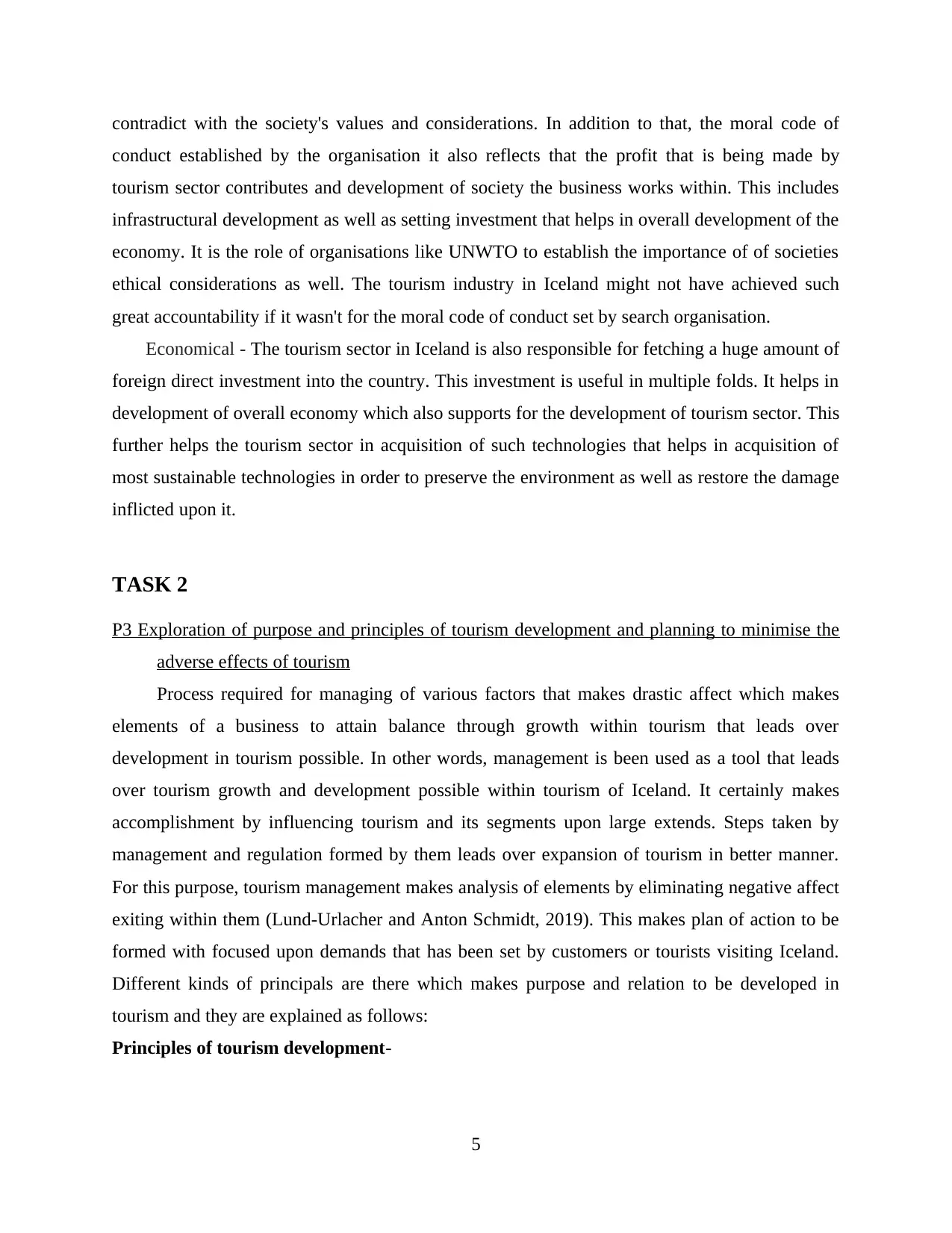
contradict with the society's values and considerations. In addition to that, the moral code of
conduct established by the organisation it also reflects that the profit that is being made by
tourism sector contributes and development of society the business works within. This includes
infrastructural development as well as setting investment that helps in overall development of the
economy. It is the role of organisations like UNWTO to establish the importance of of societies
ethical considerations as well. The tourism industry in Iceland might not have achieved such
great accountability if it wasn't for the moral code of conduct set by search organisation.
Economical - The tourism sector in Iceland is also responsible for fetching a huge amount of
foreign direct investment into the country. This investment is useful in multiple folds. It helps in
development of overall economy which also supports for the development of tourism sector. This
further helps the tourism sector in acquisition of such technologies that helps in acquisition of
most sustainable technologies in order to preserve the environment as well as restore the damage
inflicted upon it.
TASK 2
P3 Exploration of purpose and principles of tourism development and planning to minimise the
adverse effects of tourism
Process required for managing of various factors that makes drastic affect which makes
elements of a business to attain balance through growth within tourism that leads over
development in tourism possible. In other words, management is been used as a tool that leads
over tourism growth and development possible within tourism of Iceland. It certainly makes
accomplishment by influencing tourism and its segments upon large extends. Steps taken by
management and regulation formed by them leads over expansion of tourism in better manner.
For this purpose, tourism management makes analysis of elements by eliminating negative affect
exiting within them (Lund-Urlacher and Anton Schmidt, 2019). This makes plan of action to be
formed with focused upon demands that has been set by customers or tourists visiting Iceland.
Different kinds of principals are there which makes purpose and relation to be developed in
tourism and they are explained as follows:
Principles of tourism development-
5
conduct established by the organisation it also reflects that the profit that is being made by
tourism sector contributes and development of society the business works within. This includes
infrastructural development as well as setting investment that helps in overall development of the
economy. It is the role of organisations like UNWTO to establish the importance of of societies
ethical considerations as well. The tourism industry in Iceland might not have achieved such
great accountability if it wasn't for the moral code of conduct set by search organisation.
Economical - The tourism sector in Iceland is also responsible for fetching a huge amount of
foreign direct investment into the country. This investment is useful in multiple folds. It helps in
development of overall economy which also supports for the development of tourism sector. This
further helps the tourism sector in acquisition of such technologies that helps in acquisition of
most sustainable technologies in order to preserve the environment as well as restore the damage
inflicted upon it.
TASK 2
P3 Exploration of purpose and principles of tourism development and planning to minimise the
adverse effects of tourism
Process required for managing of various factors that makes drastic affect which makes
elements of a business to attain balance through growth within tourism that leads over
development in tourism possible. In other words, management is been used as a tool that leads
over tourism growth and development possible within tourism of Iceland. It certainly makes
accomplishment by influencing tourism and its segments upon large extends. Steps taken by
management and regulation formed by them leads over expansion of tourism in better manner.
For this purpose, tourism management makes analysis of elements by eliminating negative affect
exiting within them (Lund-Urlacher and Anton Schmidt, 2019). This makes plan of action to be
formed with focused upon demands that has been set by customers or tourists visiting Iceland.
Different kinds of principals are there which makes purpose and relation to be developed in
tourism and they are explained as follows:
Principles of tourism development-
5
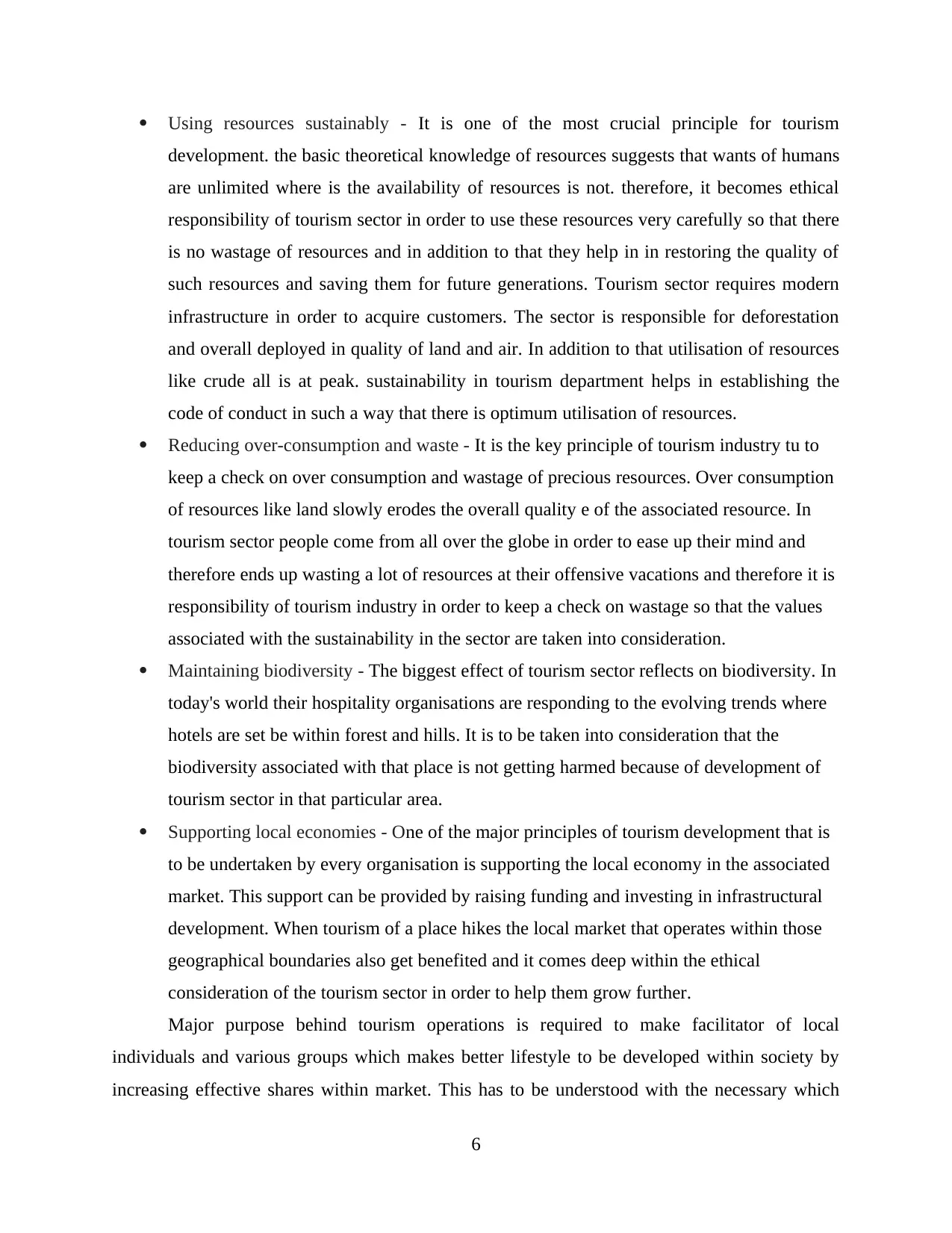
Using resources sustainably - It is one of the most crucial principle for tourism
development. the basic theoretical knowledge of resources suggests that wants of humans
are unlimited where is the availability of resources is not. therefore, it becomes ethical
responsibility of tourism sector in order to use these resources very carefully so that there
is no wastage of resources and in addition to that they help in in restoring the quality of
such resources and saving them for future generations. Tourism sector requires modern
infrastructure in order to acquire customers. The sector is responsible for deforestation
and overall deployed in quality of land and air. In addition to that utilisation of resources
like crude all is at peak. sustainability in tourism department helps in establishing the
code of conduct in such a way that there is optimum utilisation of resources.
Reducing over-consumption and waste - It is the key principle of tourism industry tu to
keep a check on over consumption and wastage of precious resources. Over consumption
of resources like land slowly erodes the overall quality e of the associated resource. In
tourism sector people come from all over the globe in order to ease up their mind and
therefore ends up wasting a lot of resources at their offensive vacations and therefore it is
responsibility of tourism industry in order to keep a check on wastage so that the values
associated with the sustainability in the sector are taken into consideration.
Maintaining biodiversity - The biggest effect of tourism sector reflects on biodiversity. In
today's world their hospitality organisations are responding to the evolving trends where
hotels are set be within forest and hills. It is to be taken into consideration that the
biodiversity associated with that place is not getting harmed because of development of
tourism sector in that particular area.
Supporting local economies - One of the major principles of tourism development that is
to be undertaken by every organisation is supporting the local economy in the associated
market. This support can be provided by raising funding and investing in infrastructural
development. When tourism of a place hikes the local market that operates within those
geographical boundaries also get benefited and it comes deep within the ethical
consideration of the tourism sector in order to help them grow further.
Major purpose behind tourism operations is required to make facilitator of local
individuals and various groups which makes better lifestyle to be developed within society by
increasing effective shares within market. This has to be understood with the necessary which
6
development. the basic theoretical knowledge of resources suggests that wants of humans
are unlimited where is the availability of resources is not. therefore, it becomes ethical
responsibility of tourism sector in order to use these resources very carefully so that there
is no wastage of resources and in addition to that they help in in restoring the quality of
such resources and saving them for future generations. Tourism sector requires modern
infrastructure in order to acquire customers. The sector is responsible for deforestation
and overall deployed in quality of land and air. In addition to that utilisation of resources
like crude all is at peak. sustainability in tourism department helps in establishing the
code of conduct in such a way that there is optimum utilisation of resources.
Reducing over-consumption and waste - It is the key principle of tourism industry tu to
keep a check on over consumption and wastage of precious resources. Over consumption
of resources like land slowly erodes the overall quality e of the associated resource. In
tourism sector people come from all over the globe in order to ease up their mind and
therefore ends up wasting a lot of resources at their offensive vacations and therefore it is
responsibility of tourism industry in order to keep a check on wastage so that the values
associated with the sustainability in the sector are taken into consideration.
Maintaining biodiversity - The biggest effect of tourism sector reflects on biodiversity. In
today's world their hospitality organisations are responding to the evolving trends where
hotels are set be within forest and hills. It is to be taken into consideration that the
biodiversity associated with that place is not getting harmed because of development of
tourism sector in that particular area.
Supporting local economies - One of the major principles of tourism development that is
to be undertaken by every organisation is supporting the local economy in the associated
market. This support can be provided by raising funding and investing in infrastructural
development. When tourism of a place hikes the local market that operates within those
geographical boundaries also get benefited and it comes deep within the ethical
consideration of the tourism sector in order to help them grow further.
Major purpose behind tourism operations is required to make facilitator of local
individuals and various groups which makes better lifestyle to be developed within society by
increasing effective shares within market. This has to be understood with the necessary which
6
⊘ This is a preview!⊘
Do you want full access?
Subscribe today to unlock all pages.

Trusted by 1+ million students worldwide
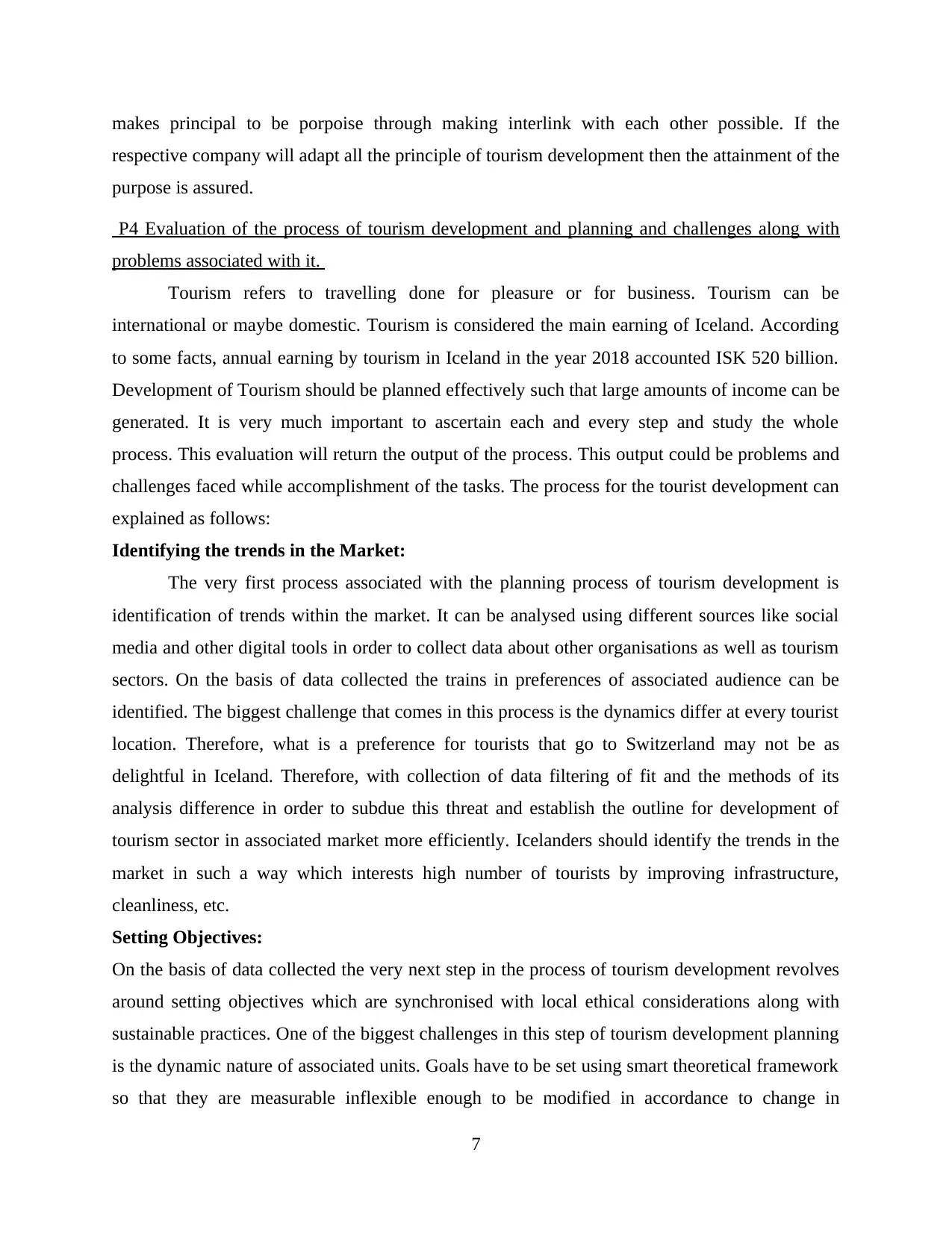
makes principal to be porpoise through making interlink with each other possible. If the
respective company will adapt all the principle of tourism development then the attainment of the
purpose is assured.
P4 Evaluation of the process of tourism development and planning and challenges along with
problems associated with it.
Tourism refers to travelling done for pleasure or for business. Tourism can be
international or maybe domestic. Tourism is considered the main earning of Iceland. According
to some facts, annual earning by tourism in Iceland in the year 2018 accounted ISK 520 billion.
Development of Tourism should be planned effectively such that large amounts of income can be
generated. It is very much important to ascertain each and every step and study the whole
process. This evaluation will return the output of the process. This output could be problems and
challenges faced while accomplishment of the tasks. The process for the tourist development can
explained as follows:
Identifying the trends in the Market:
The very first process associated with the planning process of tourism development is
identification of trends within the market. It can be analysed using different sources like social
media and other digital tools in order to collect data about other organisations as well as tourism
sectors. On the basis of data collected the trains in preferences of associated audience can be
identified. The biggest challenge that comes in this process is the dynamics differ at every tourist
location. Therefore, what is a preference for tourists that go to Switzerland may not be as
delightful in Iceland. Therefore, with collection of data filtering of fit and the methods of its
analysis difference in order to subdue this threat and establish the outline for development of
tourism sector in associated market more efficiently. Icelanders should identify the trends in the
market in such a way which interests high number of tourists by improving infrastructure,
cleanliness, etc.
Setting Objectives:
On the basis of data collected the very next step in the process of tourism development revolves
around setting objectives which are synchronised with local ethical considerations along with
sustainable practices. One of the biggest challenges in this step of tourism development planning
is the dynamic nature of associated units. Goals have to be set using smart theoretical framework
so that they are measurable inflexible enough to be modified in accordance to change in
7
respective company will adapt all the principle of tourism development then the attainment of the
purpose is assured.
P4 Evaluation of the process of tourism development and planning and challenges along with
problems associated with it.
Tourism refers to travelling done for pleasure or for business. Tourism can be
international or maybe domestic. Tourism is considered the main earning of Iceland. According
to some facts, annual earning by tourism in Iceland in the year 2018 accounted ISK 520 billion.
Development of Tourism should be planned effectively such that large amounts of income can be
generated. It is very much important to ascertain each and every step and study the whole
process. This evaluation will return the output of the process. This output could be problems and
challenges faced while accomplishment of the tasks. The process for the tourist development can
explained as follows:
Identifying the trends in the Market:
The very first process associated with the planning process of tourism development is
identification of trends within the market. It can be analysed using different sources like social
media and other digital tools in order to collect data about other organisations as well as tourism
sectors. On the basis of data collected the trains in preferences of associated audience can be
identified. The biggest challenge that comes in this process is the dynamics differ at every tourist
location. Therefore, what is a preference for tourists that go to Switzerland may not be as
delightful in Iceland. Therefore, with collection of data filtering of fit and the methods of its
analysis difference in order to subdue this threat and establish the outline for development of
tourism sector in associated market more efficiently. Icelanders should identify the trends in the
market in such a way which interests high number of tourists by improving infrastructure,
cleanliness, etc.
Setting Objectives:
On the basis of data collected the very next step in the process of tourism development revolves
around setting objectives which are synchronised with local ethical considerations along with
sustainable practices. One of the biggest challenges in this step of tourism development planning
is the dynamic nature of associated units. Goals have to be set using smart theoretical framework
so that they are measurable inflexible enough to be modified in accordance to change in
7
Paraphrase This Document
Need a fresh take? Get an instant paraphrase of this document with our AI Paraphraser
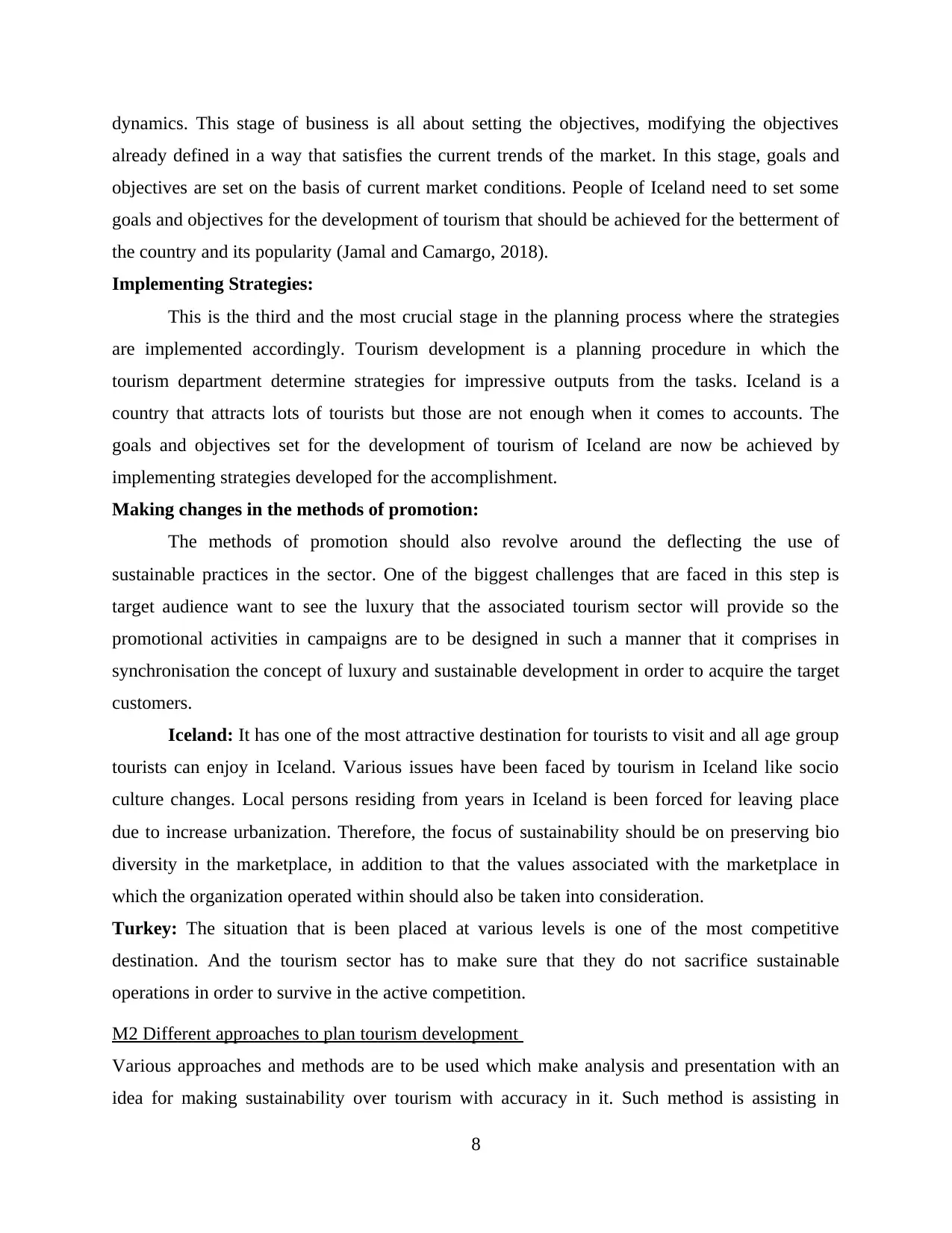
dynamics. This stage of business is all about setting the objectives, modifying the objectives
already defined in a way that satisfies the current trends of the market. In this stage, goals and
objectives are set on the basis of current market conditions. People of Iceland need to set some
goals and objectives for the development of tourism that should be achieved for the betterment of
the country and its popularity (Jamal and Camargo, 2018).
Implementing Strategies:
This is the third and the most crucial stage in the planning process where the strategies
are implemented accordingly. Tourism development is a planning procedure in which the
tourism department determine strategies for impressive outputs from the tasks. Iceland is a
country that attracts lots of tourists but those are not enough when it comes to accounts. The
goals and objectives set for the development of tourism of Iceland are now be achieved by
implementing strategies developed for the accomplishment.
Making changes in the methods of promotion:
The methods of promotion should also revolve around the deflecting the use of
sustainable practices in the sector. One of the biggest challenges that are faced in this step is
target audience want to see the luxury that the associated tourism sector will provide so the
promotional activities in campaigns are to be designed in such a manner that it comprises in
synchronisation the concept of luxury and sustainable development in order to acquire the target
customers.
Iceland: It has one of the most attractive destination for tourists to visit and all age group
tourists can enjoy in Iceland. Various issues have been faced by tourism in Iceland like socio
culture changes. Local persons residing from years in Iceland is been forced for leaving place
due to increase urbanization. Therefore, the focus of sustainability should be on preserving bio
diversity in the marketplace, in addition to that the values associated with the marketplace in
which the organization operated within should also be taken into consideration.
Turkey: The situation that is been placed at various levels is one of the most competitive
destination. And the tourism sector has to make sure that they do not sacrifice sustainable
operations in order to survive in the active competition.
M2 Different approaches to plan tourism development
Various approaches and methods are to be used which make analysis and presentation with an
idea for making sustainability over tourism with accuracy in it. Such method is assisting in
8
already defined in a way that satisfies the current trends of the market. In this stage, goals and
objectives are set on the basis of current market conditions. People of Iceland need to set some
goals and objectives for the development of tourism that should be achieved for the betterment of
the country and its popularity (Jamal and Camargo, 2018).
Implementing Strategies:
This is the third and the most crucial stage in the planning process where the strategies
are implemented accordingly. Tourism development is a planning procedure in which the
tourism department determine strategies for impressive outputs from the tasks. Iceland is a
country that attracts lots of tourists but those are not enough when it comes to accounts. The
goals and objectives set for the development of tourism of Iceland are now be achieved by
implementing strategies developed for the accomplishment.
Making changes in the methods of promotion:
The methods of promotion should also revolve around the deflecting the use of
sustainable practices in the sector. One of the biggest challenges that are faced in this step is
target audience want to see the luxury that the associated tourism sector will provide so the
promotional activities in campaigns are to be designed in such a manner that it comprises in
synchronisation the concept of luxury and sustainable development in order to acquire the target
customers.
Iceland: It has one of the most attractive destination for tourists to visit and all age group
tourists can enjoy in Iceland. Various issues have been faced by tourism in Iceland like socio
culture changes. Local persons residing from years in Iceland is been forced for leaving place
due to increase urbanization. Therefore, the focus of sustainability should be on preserving bio
diversity in the marketplace, in addition to that the values associated with the marketplace in
which the organization operated within should also be taken into consideration.
Turkey: The situation that is been placed at various levels is one of the most competitive
destination. And the tourism sector has to make sure that they do not sacrifice sustainable
operations in order to survive in the active competition.
M2 Different approaches to plan tourism development
Various approaches and methods are to be used which make analysis and presentation with an
idea for making sustainability over tourism with accuracy in it. Such method is assisting in
8
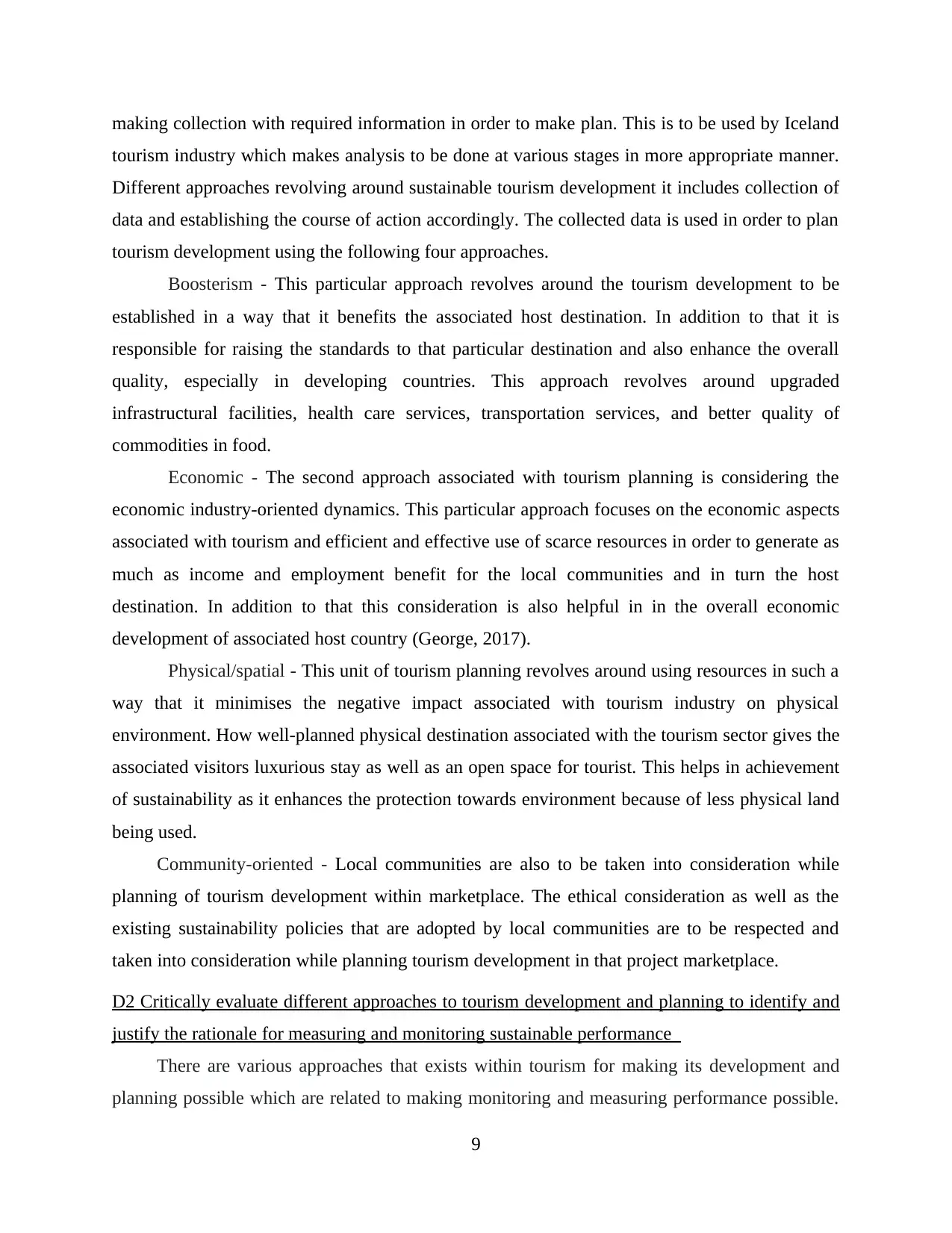
making collection with required information in order to make plan. This is to be used by Iceland
tourism industry which makes analysis to be done at various stages in more appropriate manner.
Different approaches revolving around sustainable tourism development it includes collection of
data and establishing the course of action accordingly. The collected data is used in order to plan
tourism development using the following four approaches.
Boosterism - This particular approach revolves around the tourism development to be
established in a way that it benefits the associated host destination. In addition to that it is
responsible for raising the standards to that particular destination and also enhance the overall
quality, especially in developing countries. This approach revolves around upgraded
infrastructural facilities, health care services, transportation services, and better quality of
commodities in food.
Economic - The second approach associated with tourism planning is considering the
economic industry-oriented dynamics. This particular approach focuses on the economic aspects
associated with tourism and efficient and effective use of scarce resources in order to generate as
much as income and employment benefit for the local communities and in turn the host
destination. In addition to that this consideration is also helpful in in the overall economic
development of associated host country (George, 2017).
Physical/spatial - This unit of tourism planning revolves around using resources in such a
way that it minimises the negative impact associated with tourism industry on physical
environment. How well-planned physical destination associated with the tourism sector gives the
associated visitors luxurious stay as well as an open space for tourist. This helps in achievement
of sustainability as it enhances the protection towards environment because of less physical land
being used.
Community-oriented - Local communities are also to be taken into consideration while
planning of tourism development within marketplace. The ethical consideration as well as the
existing sustainability policies that are adopted by local communities are to be respected and
taken into consideration while planning tourism development in that project marketplace.
D2 Critically evaluate different approaches to tourism development and planning to identify and
justify the rationale for measuring and monitoring sustainable performance
There are various approaches that exists within tourism for making its development and
planning possible which are related to making monitoring and measuring performance possible.
9
tourism industry which makes analysis to be done at various stages in more appropriate manner.
Different approaches revolving around sustainable tourism development it includes collection of
data and establishing the course of action accordingly. The collected data is used in order to plan
tourism development using the following four approaches.
Boosterism - This particular approach revolves around the tourism development to be
established in a way that it benefits the associated host destination. In addition to that it is
responsible for raising the standards to that particular destination and also enhance the overall
quality, especially in developing countries. This approach revolves around upgraded
infrastructural facilities, health care services, transportation services, and better quality of
commodities in food.
Economic - The second approach associated with tourism planning is considering the
economic industry-oriented dynamics. This particular approach focuses on the economic aspects
associated with tourism and efficient and effective use of scarce resources in order to generate as
much as income and employment benefit for the local communities and in turn the host
destination. In addition to that this consideration is also helpful in in the overall economic
development of associated host country (George, 2017).
Physical/spatial - This unit of tourism planning revolves around using resources in such a
way that it minimises the negative impact associated with tourism industry on physical
environment. How well-planned physical destination associated with the tourism sector gives the
associated visitors luxurious stay as well as an open space for tourist. This helps in achievement
of sustainability as it enhances the protection towards environment because of less physical land
being used.
Community-oriented - Local communities are also to be taken into consideration while
planning of tourism development within marketplace. The ethical consideration as well as the
existing sustainability policies that are adopted by local communities are to be respected and
taken into consideration while planning tourism development in that project marketplace.
D2 Critically evaluate different approaches to tourism development and planning to identify and
justify the rationale for measuring and monitoring sustainable performance
There are various approaches that exists within tourism for making its development and
planning possible which are related to making monitoring and measuring performance possible.
9
⊘ This is a preview!⊘
Do you want full access?
Subscribe today to unlock all pages.

Trusted by 1+ million students worldwide
1 out of 20
Related Documents
Your All-in-One AI-Powered Toolkit for Academic Success.
+13062052269
info@desklib.com
Available 24*7 on WhatsApp / Email
![[object Object]](/_next/static/media/star-bottom.7253800d.svg)
Unlock your academic potential
Copyright © 2020–2026 A2Z Services. All Rights Reserved. Developed and managed by ZUCOL.




